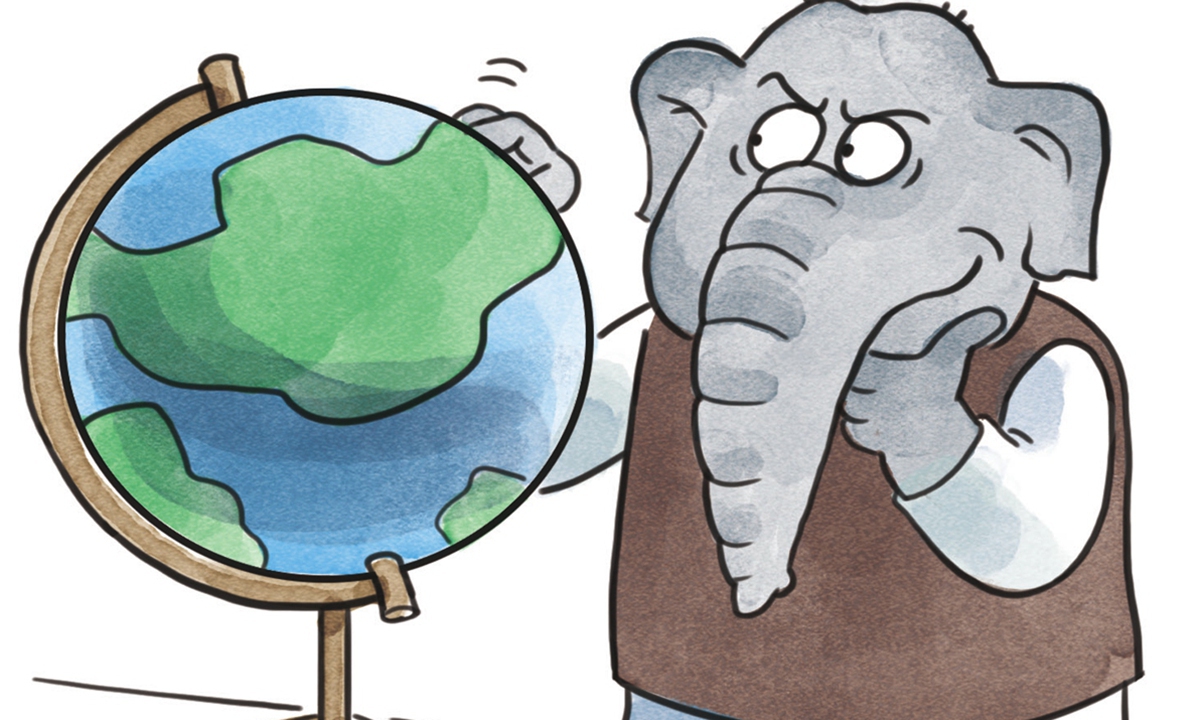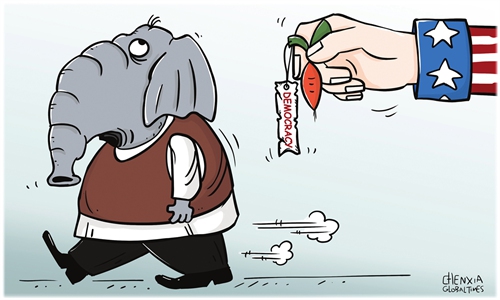India enhances interactions with Quad members, but eyes balance between major powers to reap benefit

India Illustration: Liu Rui/GT
After hosting a Quad senior officials' meeting in New Delhi and discussing "concerns over China's moves" in the Indian Ocean and Pacific Island countries with the US, Australia and Japan, India is engaging in more interactions with its Quad partners, including the Indo-Pacific Economic Framework (IPEF) ministerial meeting and meetings with the US and Japan in the 2+2 format, according to Indian news outlets.
Although India has China in mind during these interactions, Chinese observers believe New Delhi will strive to maintain a certain level of strategic autonomy and will try to strike a balance between major powers.
But the question lies in whether India's current multi-alignment policy is sustainable considering the mounting pressure from the US to use India as a strategic pawn in Asia to counter China, which constrains New Delhi's maneuvering space.
According to the Hindu, the Quad meeting, in addition to concerns over China, also discussed a vaccine initiative that has run into trouble over the past year, as well as cooperation on emerging technologies and infrastructure funding for Indo-Pacific countries.
Yet the Hindu, citing officials, reported it was "erroneous" to portray their discussions as seeking to "counter or contain" China and the meeting was not a counter-China grouping.
Other interactions with Quad partners included the US-India 2+2 US Intersessional Dialogue as well as the Maritime Security Dialogue on Wednesday and Thursday. Indian Defense Minister Rajnath Singh along with External Affairs Minister Subrahmanyam Jaishankar will participate in the second India-Japan 2+2 Ministerial Dialogue in Tokyo on Thursday.
India meanwhile participated in the Russia-hosted Vostok 2022 drills which concluded on Wednesday and the Eastern Economic Forum (EEF) in Russia's far eastern city of Vladivostok.
Speaking virtually to the EEF Wednesday, Indian Prime Minister Narendra Modi said India is keen to boost cooperation with Russia, particularly in the areas of energy and coking coal, the Hindustan Times reported.
Modi may also attend the Shanghai Cooperation Organization summit in Samarkand, Uzbekistan scheduled in mid-September, according to media reports.
Lan Jianxue, director of the Department for Asia-Pacific Studies at the China Institute of International Studies, told the Global Times on Wednesday that New Delhi is swinging between the US and Russia in the latest series of diplomatic activities, as it had been since the outbreak of the Russia-Ukraine conflict.
India wants to "reap benefits from both sides" and play its own geopolitical game, Lan said.
India will not cooperate wholeheartedly with the US. Cooperation will take place when it is in its own best interests, Zhao Gancheng, a research fellow at the Shanghai Institute for International Studies, told the Global Times.
But Lan warned India's hedging bets may jeopardize India's continuity in foreign policy and its multi-alignment strategy may not be sustainable if it is increasingly seen as a US ally, which will see it gradually losing room for autonomy and becoming a pawn of the US, Lan said.
Now, India is concentrating on becoming a developed country by 2047, and it will attach great importance to strategic independence and growing economic strength. Cooperation with China rather than all-out confrontation will better serve this goal, observers said.
Lan also noted in that in the post-Cold War era, bloc confrontation tactics are outdated and ineffective when interests of countries are intertwined. It must be stressed that China is a persistent presence in Asia and is willing to see a peaceful, stable and prosperous Asia while the US could come to the Asia-Pacific, create havoc in regional security and development opportunities, and just walk away.
Seeing through the US calculations, Lan believes the upcoming IPEF ministerial meetings will not be able to make substantial progress because the US does not want to make concessions on tariffs and market access, which Asian countries are looking for.
The idea of the IPEF was geopolitics-driven to exclude China in the supply chain, not a trade-centered agreement. Without real benefits, the US cannot court real partners, the expert said.

